1902
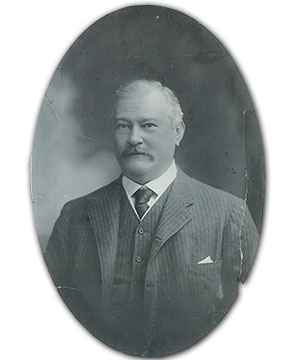 LA Adamson MA, eighth Headmaster of Wesley College, served from 1902 to 1932.
LA Adamson MA, eighth Headmaster of Wesley College, served from 1902 to 1932.
Lawrence Arthur Adamson served as a master in the late 1800s and then moved to teach elsewhere, returning as Headmaster in 1902. Wesley’s longest-serving Headmaster, he fashioned Wesley College into one of the nation’s leading schools in the early 20th century. Adamson was one of the leading educationalists of his day. Passionate about Wesley, he spent much of his considerable fortune on the College.
New preparatory school
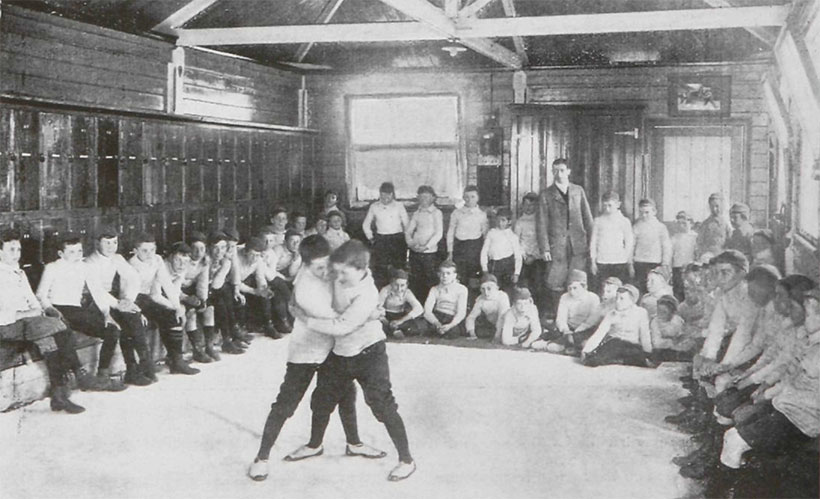
On 1 December 1902 the first assembly in the new building of the Wesley College Preparatory School, The Hutch, was held.
A small timber pavilion for juniors provided a clear space for ‘very carefully supervised’ boxing and wrestling, according to the 1909 Prospectus.
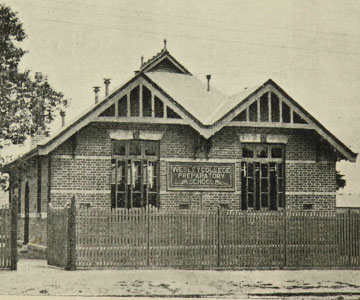
The new Prep School was opened by the President of the College, the Rev WH Fitchett. Miss EM Cooper was the first Headmistress.
1903
The year 1903 marked the return of the school colours purple and gold pictured below the school crest.
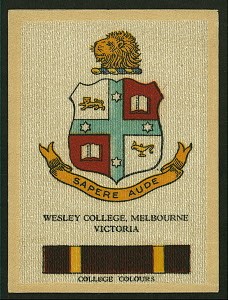
1905
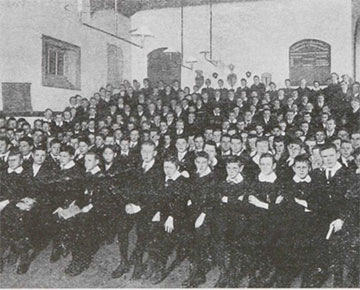 Adamson quickly increased enrolments, with daily attendance hitting a new record in 1905 with 280 pupils. By 1919, enrolments had been capped at approximately 560, creating a waiting list. The cap would remain in effect until the end of the 1930s.
Adamson quickly increased enrolments, with daily attendance hitting a new record in 1905 with 280 pupils. By 1919, enrolments had been capped at approximately 560, creating a waiting list. The cap would remain in effect until the end of the 1930s.
1906
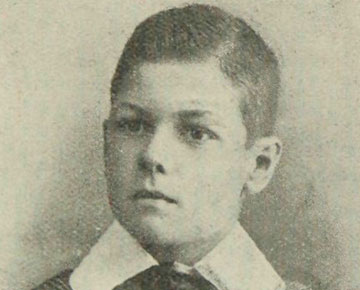 The first OWCA Scholarship was awarded to FM McCutchan the son of J McCutchan, an Old Wesley Collegian.
The first OWCA Scholarship was awarded to FM McCutchan the son of J McCutchan, an Old Wesley Collegian.
Tuck Shop
The first Tuck Shop was opened. Located halfway around the Front Turf, it was run by Mrs Donald, wife of Charlie Donald who was Wesley’s rowing coach for 40 years.
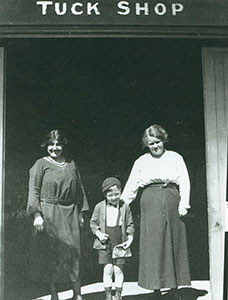
Founders' Day
The first Founders’ Day was celebrated at the Vienna Café, Melbourne.
The first Founders' Day was celebrated on 28 May 1906, the birthday of Walter Powell. In 1913 the date for the Foundation Day Dinner was changed to 1 May. The aim was to bring Old Wesley Collegians together on Founders' Days to celebrate their days at ‘the best school of all’.
New laboratories
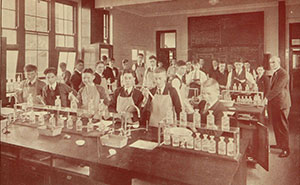
New physics and chemistry laboratories and science lecture room.
New physics and chemistry laboratories and a science lecture room were established, following a concerted fundraising campaign and a large personal donation from the Headmaster.
1907
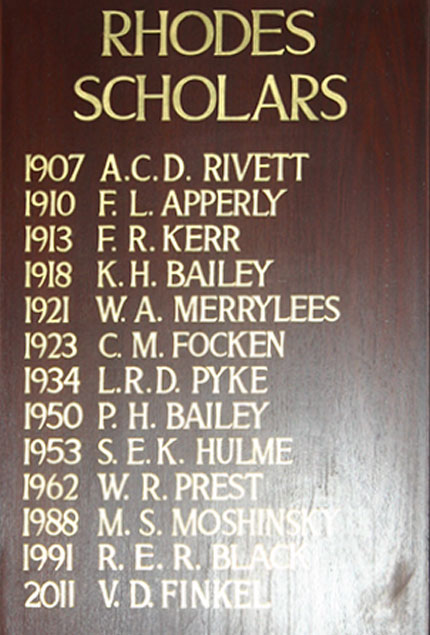
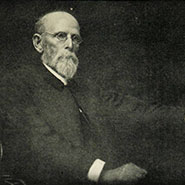
Wesley’s first Rhodes Scholar was ACD Rivett. He is the first of 13 Old Wesley Collegians on the Rhodes Scholars honour board.
Adamson Hall
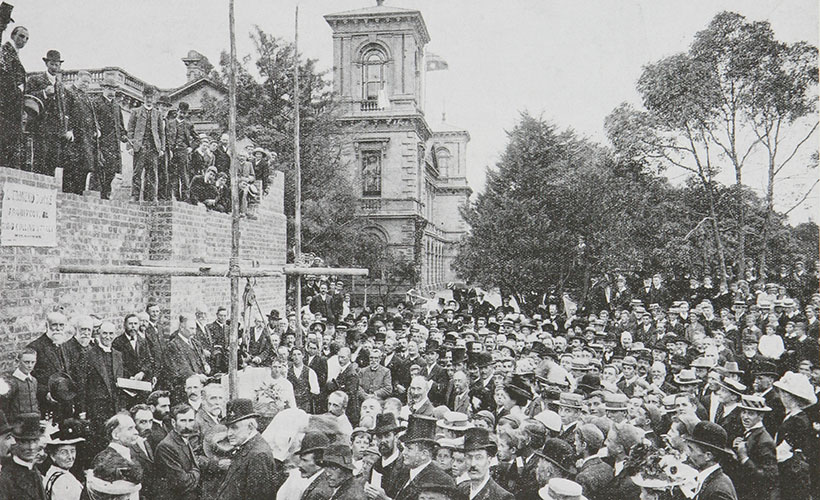
The foundation stone of the half-completed Adamson Hall was laid by LA Adamson on 6 March 1908.
1908
On 26 May 1908 the Governor of Victoria, Sir Reginald Talbot, formally opened Adamson Hall.
Constructed in 1908, Adamson Hall was the largest structural addition at Wesley during the Adamson era. Much altered, it is the school's oldest surviving building. Adamson wanted to create a gathering place for Wesley College to celebrate, perform and commiserate. Renovated and updated, Adamson Hall retains its historic appearance and continues to be one of the school’s most important gathering places.
1908
The Associated Public Schools of Victoria (APS) was formally established, with Wesley College one of its founding members.
1910
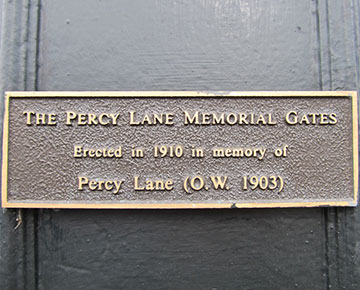 In 1910 the Percy Lane Memorial Gates at the main entrance on Moubray Street were gifted to the College by Percy’s parents in memory of their son, who had been educated for some years at Wesley.
In 1910 the Percy Lane Memorial Gates at the main entrance on Moubray Street were gifted to the College by Percy’s parents in memory of their son, who had been educated for some years at Wesley.
1913
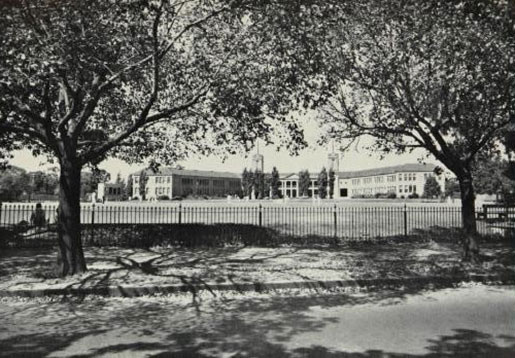 The much-admired iron picket fence of the St Kilda Road Campus was installed in 1913, the year that also marks the introduction of the three-term school year.
The much-admired iron picket fence of the St Kilda Road Campus was installed in 1913, the year that also marks the introduction of the three-term school year.
1914
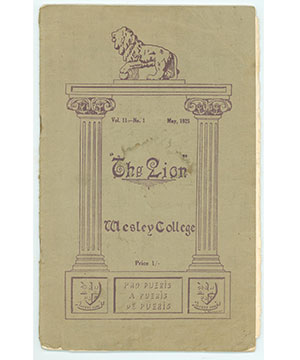 The first edition of the Lion was published.
The first edition of the Lion was published.
In its original format, the Lion was a vehicle for students to express their opinions on topics of current school interest, in prose or verse. The magazine ceased production after the First World War. The present-day Lion was relaunched as a community magazine in 1962 and has been in production ever since.
1916
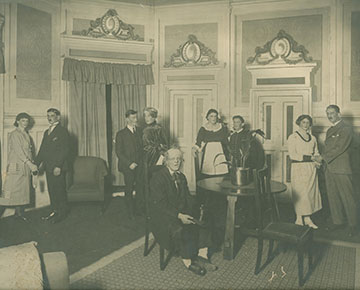 The Wesley College Dramatic Society was launched.
The Wesley College Dramatic Society was launched.
Prior to 1916, plays had only been produced at irregular intervals for the benefit of a school fund. The OWCA was appealing for funds for scholarships for the sons of fallen soldiers, so Adamson called a meeting of all boys in the school who were interested in acting. The first play to be staged was Vice Versa. According to the Chronicle for May 1917: ‘This first effort of the Dramatic Society was an astonishing success.’
Jubilee Medal
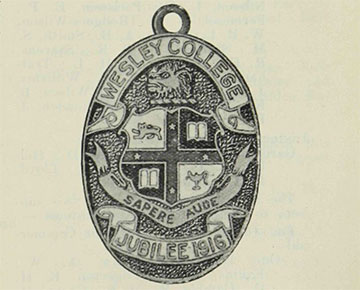 The first 60 years of Wesley College were celebrated with the production of a Jubilee Medal.
The first 60 years of Wesley College were celebrated with the production of a Jubilee Medal.
There was no other celebration because of the First World War.
War memorial lions
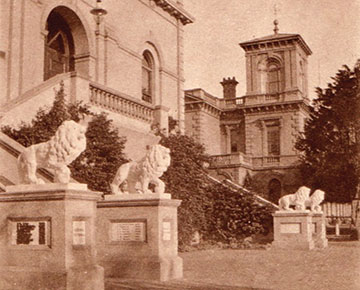 The war memorial lions were installed in May 1916.
The war memorial lions were installed in May 1916.
The St Kilda Road Campus of Wesley College is home to many honour boards and war memorials. The most conspicuous are the four lions, sculpted at Headmaster Adamson's request and expense from 'almost translucently white and pure Sicilian marble' by the Italian-born sculptor Ettore Cadorin. At the time Adamson commissioned the work, the Wesley death toll in the war is thought to have been two dozen.
1918
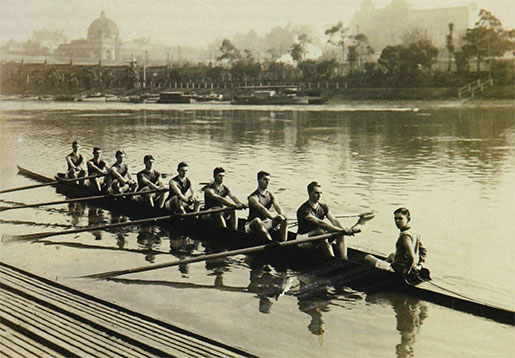 Counting the cost of the First World War on 11 November 1918: four of the nine boys of the 1911 winning crew (pictured) had died by the end of the war. By the end of the war, the death toll was at least 148.
Counting the cost of the First World War on 11 November 1918: four of the nine boys of the 1911 winning crew (pictured) had died by the end of the war. By the end of the war, the death toll was at least 148.
1920
The School Orchestra was formed under the direction of Music Master Hermann Morris.
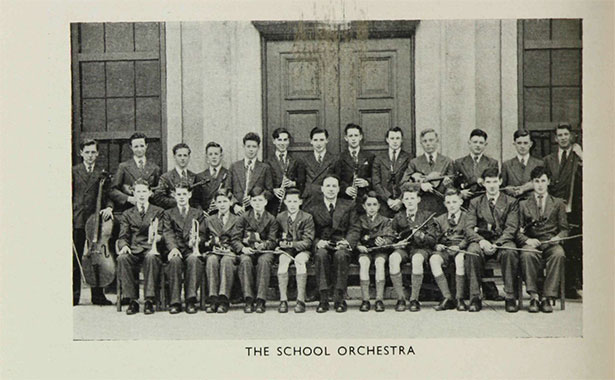
Lifesaving
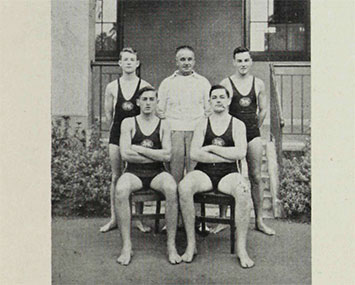 Lifesaving was instituted in 1920 as a result of Wesley’s involvement with the Royal Life Saving Society Australia, Victoria Branch, established in 1904.
Lifesaving was instituted in 1920 as a result of Wesley’s involvement with the Royal Life Saving Society Australia, Victoria Branch, established in 1904.
1921
The first history of Wesley College 1865-1919, edited by Reverend E Nye, was published.
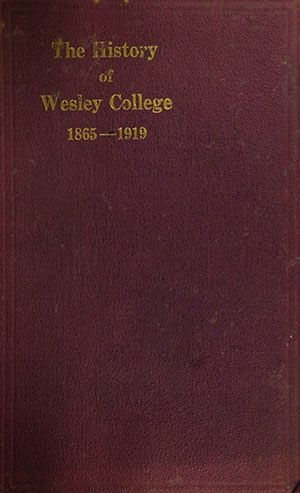
Melbourne Technical School
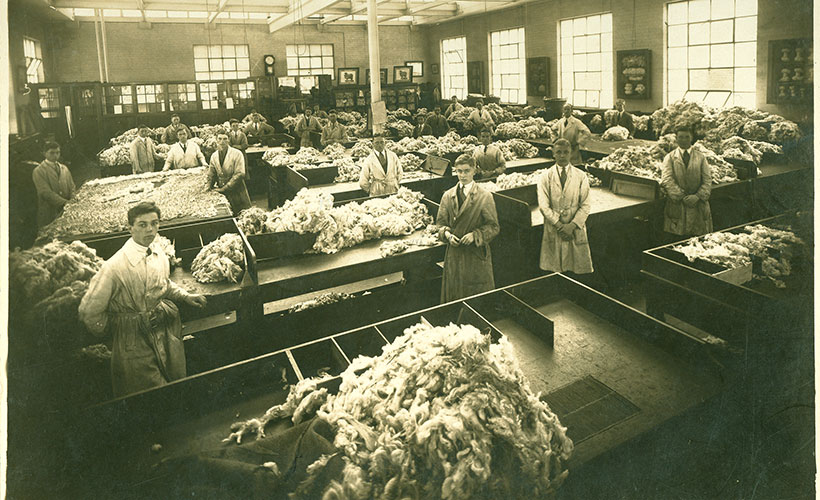
A wool sorting class at the Melbourne Technical School was instituted and proved particularly useful for the boarders from rural areas.
1922
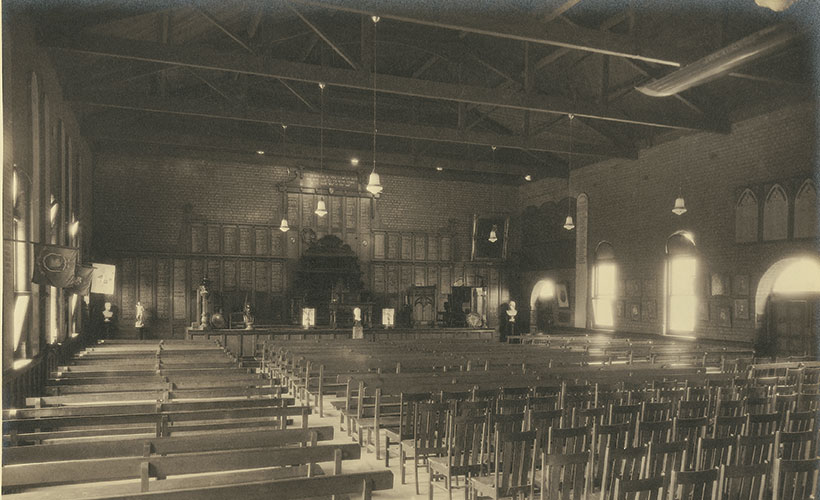
Adamson Hall is fitted with electric light.
1923
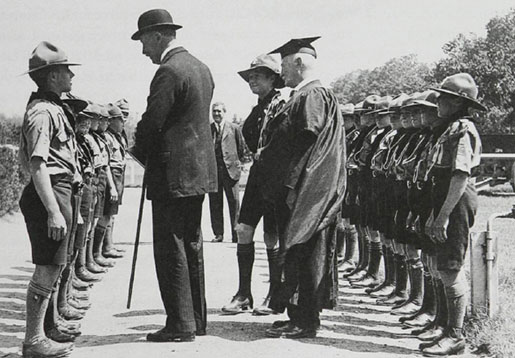
The first troop of Boy Scouts was instituted, with Mr W Kennedy as the Scout Master. Mrs Harold Stewart generously paid for equipment and presented 12 acres of land at Gembrook for the use of the Scouts.
1924
Melbourne University granted the College permission to conduct the exams for School Intermediate and Leaving Pass candidates on its behalf.
House system introduced
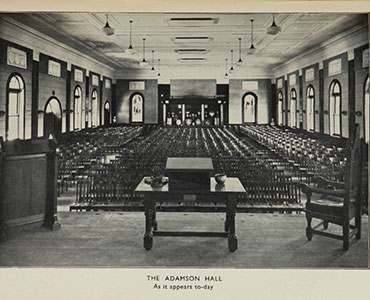 The House system was introduced. The four Houses were named Corrigan, Irving, Way and Adamson.
The House system was introduced. The four Houses were named Corrigan, Irving, Way and Adamson.
1925
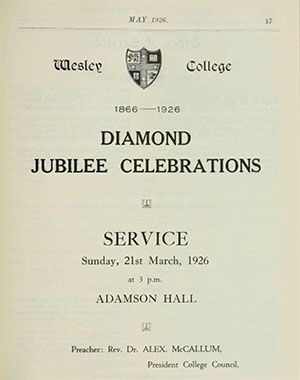 At the suggestion of the Headmaster, a system of donating to pay for individual chairs for Adamson Hall was instituted. By 1934 the total number of funded chairs reached 675.
At the suggestion of the Headmaster, a system of donating to pay for individual chairs for Adamson Hall was instituted. By 1934 the total number of funded chairs reached 675.
